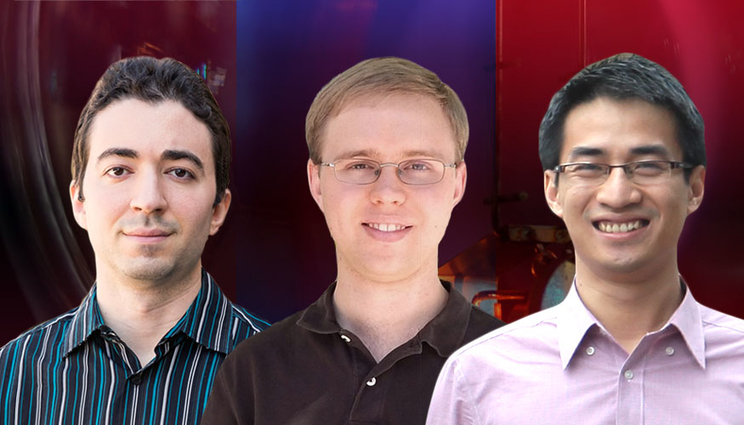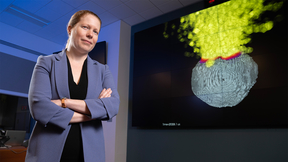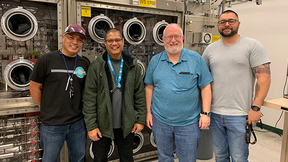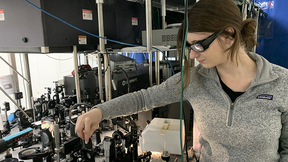Lawrence Fellowships awarded for 2014
 (Download Image)
(Download Image)
Michael Campanell, Eric Neuscamman, and Tuan Anh Pham were awarded the Lawrence fellowship because of their exceptional talent, scientific track records and potential for significant achievements.
The Lawrence Livermore National Laboratory (LLNL) has awarded three individuals the Lawrence Fellowship, a highly-competitive postdoctoral position awarded to candidates with exceptional talent, scientific track records, and potential for significant achievements. Recipients are awarded three year Fellowships and are free to pursue their own research agenda under the guidance of a senior staff scientist who serves as a mentor. The fellows most often conduct their research in a collaborative, multidisciplinary manner with others in a team environment.
Recipients of the prestigious Lawrence Fellowship are Michael Campanell, Eric Neuscamman and Tuan Anh Pham.
Michael Campanell
Campanell graduated with a bachelor's degree summa cum laude in 2008 from Temple University with a double major in physics and mathematics. He continued his education at Princeton University where he received his master's degree (2010) and doctorate (2014) in astrophysical sciences.Campanell will start his fellowship at LLNL in late September. He will be working in the Fusion Theory and Computations group in the Physical & Life Sciences Directorate. His fellowship will be used to research methods to mitigate the plasma-wall interaction problems in magnetic fusion machines.
Campanell was inspired to pursue a career in Science, Technology, Engineering and Math (STEM) so that he could contribute something that would make a positive difference in the world. "Within STEM I ended up choosing fusion research because it could someday benefit essentially everyone," he said. Campanell was attracted to LLNL because of the great fusion scientists that work here, the computing resources available for simulations and the synergies that happen among staff of different disciplines. "When I visited LLNL, many of the scientists told me how often they shared ideas and even collaborated with people they never expected to. I look forward to working in that kind of atmosphere."
Campanell advises students interested in STEM careers to learn as much as possible about their prospective career path. "I imagine many high school students have the wrong impression, as I did, that you would just major in the subject in college and then get your job as a scientist at age 22, which is not the case," he said. In his spare time, Campanell likes to try new activities and enjoys bowling, table tennis, badminton and watching football.
Campanell was recently featured in an article on the Princeton University website. (see photo )
Eric Neuscamman
Neuscamman graduated summa cum laude from the University of California, Los Angeles in 2006 with bachelor degrees in physical chemistry and chemical engineering and with a minor in mathematics. He received his doctorate in 2011 from Cornell University in theoretical chemistry and was a Miller Research Fellow at the University of California Berkeley from 2011- 2014. Neuscamman started his fellowship in May working in the Condensed Matter and Materials Division in the Physical & Life Sciences Directorate. His fellowship will be used to develop new methods in electronic structure theory, specifically in the area of Quantum Monte Carlo, with the intention of addressing some of the most glaring shortcomings of density functional theory and other currently available methods.
Neuscamman was inspired to pursue a career in STEM by his parents, the Mathcounts program at Mendenhall Middle School (taught at the time by an LLNL physicist) and his high school chemistry teacher. "I have always enjoyed math and using it to solve puzzles, which is essentially what I do for a job now," he said. He was drawn to LLNL due to its position as a world leader in scientific computing. He is most looking forward to the freedom the Lawrence Fellowship offers to focus on deep, relatively long term problems in basic scientific research. "This opportunity is unique in that it allows me to explore the intersection between basic scientific problems and national security priorities," he said.
As a valedictorian of his Granada High School class of 2002, Neuscamman would like to advise high school students interested in STEM to learn as much math as possible in high school (and beyond). "College-level science and engineering courses will be more satisfying and less confusing if your mathematical foundation is more prepared for them," he said. "Also, during college, seek out summer internships and undergraduate research opportunities in fields that interest you, as these are extremely helpful for lining up employment later on. Finally, accept that STEM courses will often require lots of hard work and remind yourself that this work is the price of entry into one of the most secure and exciting career paths you could choose."
Apart from science, Neuscamman spends his time parenting, reading and occasionally playing video games. (see photo )
Tuan Anh Pham
Pham graduated from the Hanoi National University of Education in Hanoi, Vietnam, in 2006 with a bachelor's degree in physics. He is currently working on his doctorate in physical chemistry at the University of California, Davis. Pham will start his fellowship at LLNL in September. He will be working in the Quantum Simulations group in the Condensed Matter and Materials Division in the Physical & Life Sciences Directorate. His fellowship will be used to work on the development and applications of first-principle methods in the framework of density functional theory and many-body perturbation theory, to study fundamental physical and chemical properties of materials, with a focus on heterogeneous interfaces.
It was Pham's love for physics and his desire to understand and explain how matter interacts that inspired him to pursue a career in STEM. He was attracted to LLNL due to the excellent working environment, opportunities to work on top R&D projects and extraordinary facilities such as a first-class computational infrastructure. "Everyone is very welcoming, supportive and is great to work with," he said. "I am looking forward to the opportunity to understand, predict and design materials with quantum mechanics and supercomputers to help make LLNL one of the leading institutes for computational materials research."
Pham is a Lawrence Graduate Scholar and a graduate of the Computational Chemistry and Materials Science Summer Institute. His advice for students interested in STEM is to try and have a good mathematics background. "Every career in STEM relies heavily on mathematics, and having a good mathematics background is a good starting point," he said.
In his spare time, Pham likes to travel, go on short road trips and play soccer. He also enjoys gardening.(see photo )
For more information on the Lawrence Fellowship, visit the Web.
Contact
 Carrie L Martin
Carrie L Martin
[email protected]
(925) 424-4715
Related Links
Lawrence FellowshipsLLNL postdocs
Related Files
DownloadTags
ScienceFeatured Articles







